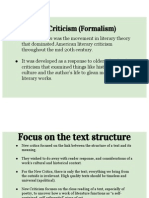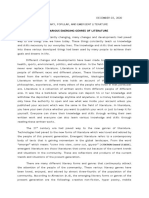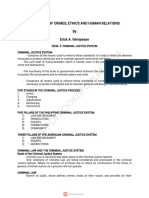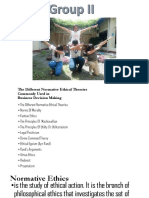100%(2)100% found this document useful (2 votes)
883 viewsDeconstruction
Deconstruction
Uploaded by
Jobu BCFrench philosopher Jacques Derrida pioneered the theory of deconstruction. Some key points of deconstruction include questioning assumptions about certainty, identity, and truth. It challenges the ability of language to communicate meaning and regards meaning as coming from differences between words rather than references to things. Deconstruction examines how texts undermine their own structure and logic.
Copyright:
© All Rights Reserved
Available Formats
Download as PPTX, PDF, TXT or read online from Scribd
Deconstruction
Deconstruction
Uploaded by
Jobu BC100%(2)100% found this document useful (2 votes)
883 views22 pagesFrench philosopher Jacques Derrida pioneered the theory of deconstruction. Some key points of deconstruction include questioning assumptions about certainty, identity, and truth. It challenges the ability of language to communicate meaning and regards meaning as coming from differences between words rather than references to things. Deconstruction examines how texts undermine their own structure and logic.
Original Description:
A powerpoint presentation on Deconstruction as a literary criticism.
Copyright
© © All Rights Reserved
Available Formats
PPTX, PDF, TXT or read online from Scribd
Share this document
Did you find this document useful?
Is this content inappropriate?
French philosopher Jacques Derrida pioneered the theory of deconstruction. Some key points of deconstruction include questioning assumptions about certainty, identity, and truth. It challenges the ability of language to communicate meaning and regards meaning as coming from differences between words rather than references to things. Deconstruction examines how texts undermine their own structure and logic.
Copyright:
© All Rights Reserved
Available Formats
Download as PPTX, PDF, TXT or read online from Scribd
Download as pptx, pdf, or txt
100%(2)100% found this document useful (2 votes)
883 views22 pagesDeconstruction
Deconstruction
Uploaded by
Jobu BCFrench philosopher Jacques Derrida pioneered the theory of deconstruction. Some key points of deconstruction include questioning assumptions about certainty, identity, and truth. It challenges the ability of language to communicate meaning and regards meaning as coming from differences between words rather than references to things. Deconstruction examines how texts undermine their own structure and logic.
Copyright:
© All Rights Reserved
Available Formats
Download as PPTX, PDF, TXT or read online from Scribd
Download as pptx, pdf, or txt
You are on page 1of 22
• French philosopher, literary
critic, journalist, scholar and
academic
• Some of his important works
include 'Writing and Difference,'
'Speech and Phenomena,' and
'Of Grammatology,'
• His paper 'Structure,Sign, and
Play in the Discourse of the Human
Sciences,' virtually inaugurated a
new critical analysis known
as deconstruction
• a philosophy and a
method of literary
analysis that questions
traditional assumptions
about certainty,
identity, and truth;
• regards meaning as
resulting from the
differences between
words rather than their
reference to the things
they stand for
• challenges the ability
of language to
communicate or represent
Author? Text? Reader?
• Rather, deconstruction is interested in the idea
that meaning breaks apart.
• The notion of ‘structure’, as Derrida argues even
in structuralist theory has always presupposed a
centre, (the principle of unity which underlies
the structure), to draw meaning of some sort.
• The desire for a centre is called logocentrism in
Derrida’s classic work, Of Grammatology.
• People desire a centre because it guarantees a
being as presence. (e.g. we think of our mental
and physical life as centred on an ‘I’)
• Deconstruction is concerned with the decentred
and undecidable.
• Think of a tree. How would you
describe it?
• Difference deals with using what the
tree is not, in an attempt to
explain what it actually is.
• However, we can never truly know the
definition of anything because we
can never really say what
something is.
• We are only depending on each
other's experiences and not
really defining a tree.
• Thus, all meanings are eternally
• Deconstruction wants to
note, and reverse these
hierarchies.
• Derrida refuses to assert a
new hierarchy.
• He uses the term
‘supplement’ to convey the
unstable relationship of
these couplets.
• Deconstruction opposes the
binary thinking altogether.
• Belgian-born deconstructionist
literary critic and theorist.
• Instrumental in popularizing
deconstruction as a form of
literary criticism in the United
States.
• His book circled around the paradox
that critics only achieve insight
through a certain blindness.
• Criticism must be ignorant of the
insight it produces.
• The Sterling Professor emeritus of
English and Comparative Literature
at Yale University.
• His critical writings are
frequently interrupted and
complicated by such ‘imperfect’
references.
• Critical reading should aim not to
produce consistent meaning but to
reveal ‘contradictions and
equivocations’ in order to make
fiction ‘interpretable by making it
less readable’.
• Distinguished Professor of English
at the University of California
Irvine.
• As a preeminent American
deconstructionist, he is well-known
for his explanation of the theory
in his essay Stevens’ Rock and
Criticism as Cure (1976):
“Deconstruction is not a
dismantling of the structure of a
text, but a demonstration that it
has already dismantled itself. Its
apparently solid ground is no
• Foucault regards discourse as a
central human activity, but not as a
universal ‘general text’, a vast sea
of signification.
• It is evident that real power is
exercised through discourse, and that
this power has real effects.
• However, there are the social
constraints, especially the formative
power of the education system which
defines what is rational and
scholarly.
• The regulation of specific disciplines
involves very refined rules for
• Foucault denies that we can ever
possess an objective knowledge of
History.
• However, Foucault does not treat the
strategies writers use to make sense
of History as merely textual play.
• Such discourses are produced within a
real world of power struggle.
• “There are no absolutely ‘true’
discourses, only more or less powerful
ones.”
• Initiated a new kind of
intertextual historical theory
which is inevitably an
interventionist one since it
assists in remaking the past.
• Challenges the old historicism on
several grounds and establishes a
new set of assumptions:
1. There are two meanings of the
word ‘history’: (a) ‘the events
of the past’ and (b) ‘telling a
story about the events of the
past’.
2. Historical periods are not
unified entities.
3. Historians can no longer claim
that their study of the past is
• British counterpart of New
Historicism
• Developed a more politically
radical type of historicism.
• They see Foucault as implying
a more precarious and
unstable structure of power,
and they often aim to derive
from his work a history of
‘resistances’ to dominant
ideologies.
• A commitment to transgressive
and oppositional voices to
become more explicit.
You might also like
- Chapter 1-The Ethical Dimension of Human ExistenceDocument35 pagesChapter 1-The Ethical Dimension of Human ExistenceMa. Christina Bangngay88% (8)
- Lecture 3 The Revolutionary Period of American LiteratureDocument2 pagesLecture 3 The Revolutionary Period of American LiteratureAb Dou67% (3)
- New CriticismDocument5 pagesNew Criticismapi-2796740600% (1)
- The Cinderella Story: A Critical Theory ApproachDocument7 pagesThe Cinderella Story: A Critical Theory ApproachKathya Balani Nabore33% (3)
- Beginning Theory StudyguideDocument29 pagesBeginning Theory StudyguideSuhad Jameel Jabak83% (6)
- Literary Criticism MidtermDocument2 pagesLiterary Criticism MidtermWinefredo Quiapo PaghubasanNo ratings yet
- American Literature TimelineDocument2 pagesAmerican Literature TimelineJoanna Dandasan100% (1)
- Recent Trends in Literary CriticismDocument21 pagesRecent Trends in Literary Criticismkarthika4aNo ratings yet
- Aurelius MeditationsDocument76 pagesAurelius Meditationsdanintegra252No ratings yet
- Vaf1a Visitandshorttermstay 11 18Document12 pagesVaf1a Visitandshorttermstay 11 18tabish_khattakNo ratings yet
- Architecture in Translation by Esra AkcanDocument46 pagesArchitecture in Translation by Esra AkcanDuke University Press100% (2)
- Feminist Literary CriticismDocument21 pagesFeminist Literary Criticismapi-373506180100% (1)
- Marxist Literary CriticismDocument1 pageMarxist Literary CriticismHazim Calixto LimmayogNo ratings yet
- Feminist Criticism Literature and TheoryDocument7 pagesFeminist Criticism Literature and TheoryNauman Mashwani100% (1)
- DeconstructionDocument31 pagesDeconstructionWaris BrarNo ratings yet
- New HistoricismDocument17 pagesNew Historicismsahar saleemNo ratings yet
- Renaissance CriticismDocument12 pagesRenaissance CriticismCiara Janine Meregildo100% (1)
- Because I Could Not Stop For DeathDocument6 pagesBecause I Could Not Stop For DeathEllaAdayaMendiolaNo ratings yet
- Feminist Stylistics: Language and Gender Studies Critical Issues and Topics Linguistic FeminismDocument7 pagesFeminist Stylistics: Language and Gender Studies Critical Issues and Topics Linguistic FeminismSofiya Figura0% (1)
- Formalist Criticism: - An Acronym For Russian WordsDocument3 pagesFormalist Criticism: - An Acronym For Russian WordsTC F. SawiNo ratings yet
- Literary Theory and Schools of CriticismDocument18 pagesLiterary Theory and Schools of CriticismMęawy MįlkshãkeNo ratings yet
- Stylistics 2021Document2 pagesStylistics 2021Draque TorresNo ratings yet
- Feminist Stylistics:: Historical PerspectiveDocument2 pagesFeminist Stylistics:: Historical PerspectiveAaqib HarganNo ratings yet
- Mythology and Folklore (Reading Materials)Document12 pagesMythology and Folklore (Reading Materials)George Kevin TomasNo ratings yet
- New Historicism & Cultural Materialism NotesDocument5 pagesNew Historicism & Cultural Materialism NotesTargaryen WolfyNo ratings yet
- MultilingualismDocument9 pagesMultilingualismLeslie Ann Niefes100% (1)
- ENG 415 Literary Theory and Criticism PDFDocument150 pagesENG 415 Literary Theory and Criticism PDFSorin Telpiz100% (2)
- Presentation1. DeconstructionDocument18 pagesPresentation1. DeconstructionVidhuNo ratings yet
- Theories of Criticism Assignment On Structuralism and Post-StructuralismDocument7 pagesTheories of Criticism Assignment On Structuralism and Post-StructuralismTadele Molla ታደለ ሞላNo ratings yet
- Russian Formalism and New CriticismDocument6 pagesRussian Formalism and New Criticismmohamed100% (2)
- 1) Definition, History-StructuralismDocument12 pages1) Definition, History-StructuralismRifa Kader Disha100% (2)
- Literary Theory Workshop Handout - StructuralismDocument1 pageLiterary Theory Workshop Handout - Structuralismapi-340543413100% (1)
- Module 7 Stylistics and Discourse AnalysisDocument41 pagesModule 7 Stylistics and Discourse AnalysisPrincess PortezaNo ratings yet
- Historical CriticismDocument4 pagesHistorical CriticismNikka ClaveriaNo ratings yet
- Classical LiteratureDocument31 pagesClassical LiteratureCharles Tan Cuadra100% (1)
- The Elegy Written in A Country Churchyard PPT by Priyanka Bairagi 2Document8 pagesThe Elegy Written in A Country Churchyard PPT by Priyanka Bairagi 2Priyanka Bairagi100% (1)
- Tragic ComedyDocument4 pagesTragic ComedyRizki Fajar Ko100% (1)
- Medieval LiteratureDocument10 pagesMedieval LiteratureLeila DizonNo ratings yet
- A Critical Overview of Literary Criticism in English LiteratureDocument13 pagesA Critical Overview of Literary Criticism in English LiteratureSIMHACHALAM THAMARANANo ratings yet
- Language Acquisition - Nature Vs NurtureDocument5 pagesLanguage Acquisition - Nature Vs NurtureJoanna Tardio Bassaletti0% (1)
- The Ultimate Safari-LACARDocument8 pagesThe Ultimate Safari-LACARJoshua Lander Soquita CadayonaNo ratings yet
- Characteristics of Literary Periods and Movements: CandideDocument2 pagesCharacteristics of Literary Periods and Movements: CandideRebeh MALOUKNo ratings yet
- LITERARY CRITICISM PresentationDocument19 pagesLITERARY CRITICISM PresentationSara AbdullahNo ratings yet
- Elec 1 Stylistics and Discourse Analysis (Review)Document12 pagesElec 1 Stylistics and Discourse Analysis (Review)Aldrianne LiganNo ratings yet
- TransitivityDocument21 pagesTransitivityRiskaLestariNo ratings yet
- Hamlet PowerpointDocument34 pagesHamlet PowerpointGălie Vlad100% (1)
- Literary Periods & GenresDocument7 pagesLiterary Periods & GenresAtheefa NazlieNo ratings yet
- DeconstructionDocument14 pagesDeconstructionJauhar JauharabadNo ratings yet
- I Give You Thanks My GodDocument2 pagesI Give You Thanks My GodAtika Zane100% (1)
- CHAPTER 8 - Psychoanalytic Literary CriticismDocument11 pagesCHAPTER 8 - Psychoanalytic Literary CriticismApenton MimiNo ratings yet
- Feminist Literary CriticismDocument18 pagesFeminist Literary CriticismLinconJeet100% (3)
- Research Topics in English LiteratureDocument2 pagesResearch Topics in English Literaturedoit100% (1)
- Literary CriticismDocument42 pagesLiterary CriticismHeena Chouhan100% (1)
- EXISTENSIALISMDocument4 pagesEXISTENSIALISMMercyNo ratings yet
- Critical TheoryDocument120 pagesCritical TheoryRoyam Murali100% (1)
- Classical Literary TheoryDocument7 pagesClassical Literary TheoryGeorge Tabobo0% (1)
- New Historicism - A Brief Write UpDocument6 pagesNew Historicism - A Brief Write UpSherrif Kakkuzhi-Maliakkal100% (2)
- Literary TheoryDocument6 pagesLiterary TheoryM irfan hashmiNo ratings yet
- Popular LiteratureDocument8 pagesPopular LiteratureClarisse Madayag100% (1)
- Killers of Balanced ReportingDocument6 pagesKillers of Balanced ReportingaserehtblaireNo ratings yet
- Old English (Anglo-Saxon) Period (450-1066)Document6 pagesOld English (Anglo-Saxon) Period (450-1066)I Putu ArtawanNo ratings yet
- English American LiteratureDocument18 pagesEnglish American LiteratureImelda Arreglo-AgripaNo ratings yet
- Literary Criticism Lecture Seven Neoclassical CriticismDocument21 pagesLiterary Criticism Lecture Seven Neoclassical CriticismJana Wael80% (5)
- Post StructuralismDocument40 pagesPost StructuralismYasir AslamNo ratings yet
- Ra 747Document16 pagesRa 747akiyanyanNo ratings yet
- Psychological Theory Research and Juvenile DelinquencyDocument15 pagesPsychological Theory Research and Juvenile DelinquencyCristina-Andreea BratuNo ratings yet
- Hegel - GlossaryDocument4 pagesHegel - GlossaryAbeona100% (1)
- Hari IniDocument2 pagesHari IniTrihariNo ratings yet
- The Sacred Substance AskokinDocument3 pagesThe Sacred Substance AskokinRemus Nicoara100% (2)
- (Crim Soc UCV) CRIMINAL JUSTICE SYSTEMDocument20 pages(Crim Soc UCV) CRIMINAL JUSTICE SYSTEMMichael SmithNo ratings yet
- Chapter 1 Leg CounDocument2 pagesChapter 1 Leg CounBo DistNo ratings yet
- DocumentDocument8 pagesDocumentAshish SamjohnNo ratings yet
- What Factors Enhance Positive Principal-Teachers RelationshipsDocument2 pagesWhat Factors Enhance Positive Principal-Teachers Relationshipssara fahmy100% (1)
- Report of The Discipline Task GroupDocument69 pagesReport of The Discipline Task GroupMuhammad SaalimNo ratings yet
- Research Methodology and Legal WritingDocument2 pagesResearch Methodology and Legal Writingakshat100% (1)
- Oahu Zip Codes of Sex OffendersDocument1 pageOahu Zip Codes of Sex OffendersHonolulu Star-AdvertiserNo ratings yet
- 2022년 5월 고2 이투스 전국 모의고사 영어 문제지-보기Document8 pages2022년 5월 고2 이투스 전국 모의고사 영어 문제지-보기8955388No ratings yet
- Good GovernanceDocument42 pagesGood Governancekristinecastor18No ratings yet
- Arbitration Demand - Cyande GroupDocument9 pagesArbitration Demand - Cyande GroupTechCrunchNo ratings yet
- April 07, 2008 Motion in Opposition To Florida Bar Filed by Greenberg TraurigDocument139 pagesApril 07, 2008 Motion in Opposition To Florida Bar Filed by Greenberg TraurigiviewitNo ratings yet
- Jose Rizal and Philippine - PptfinalsDocument2 pagesJose Rizal and Philippine - PptfinalsVernadel ApolloNo ratings yet
- Theories and Concept of JusticeDocument66 pagesTheories and Concept of JusticeSahil SafdarNo ratings yet
- Design of Disaster Crisis Center Function Based On Crisis Management ConceptDocument14 pagesDesign of Disaster Crisis Center Function Based On Crisis Management ConceptAang GunawanNo ratings yet
- Paying For The Party CH 1 and 2 NotesDocument3 pagesPaying For The Party CH 1 and 2 NotesEmNo ratings yet
- Changing Aspects of Family Laws With Respect To EvolveDocument16 pagesChanging Aspects of Family Laws With Respect To Evolvesurya srivastavaNo ratings yet
- Filipino ValuesDocument28 pagesFilipino ValuesMarna Tupaz-Lopez100% (2)
- CompulsiveDocument70 pagesCompulsiveanisasyira06No ratings yet
- Oca v. TormisDocument3 pagesOca v. Tormisjclg21100% (3)
- PSPE Identity SSDocument2 pagesPSPE Identity SSmalissa nugeraNo ratings yet
- Oil Pollution Compensation ActDocument14 pagesOil Pollution Compensation ActEdmart VicedoNo ratings yet

























































































